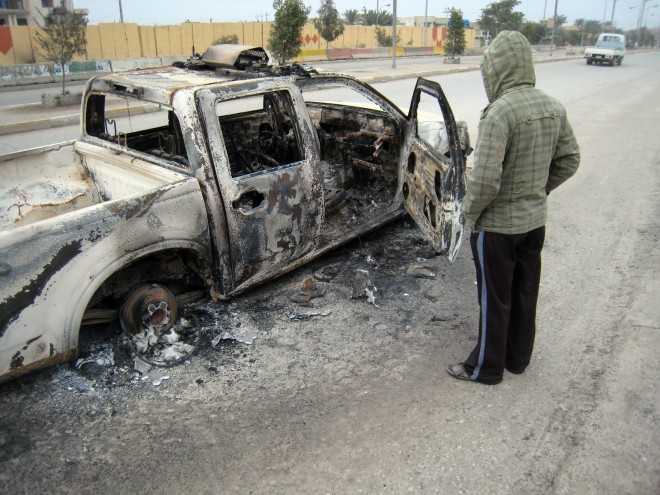Bombings kill 20 in Iraq’s capital

A man looks at a burned police vehicle in the main street of Fallujah after clashes between Iraqi security forces and al-Qaeda fighters in Fallujah, 40 miles (65 kilometers) west of Baghdad, Iraq, Sunday, Jan. 5, 2014. AP PHOTO
BAGHDAD—A new wave of bombings hit Iraq’s capital, Baghdad, killing at least 20 people Sunday, officials said, the latest assault by militants who have been fighting Iraqi security forces and allied tribes in the country’s west.
The deadliest attack took place in Baghdad’s Shiite northern Shaab neighborhood, when two parked car bombs exploded simultaneously near a restaurant and a tea house. Officials say those blasts killed 10 people and wounded 26.
Authorities said that a parked car bomb ripped through in the capital’s Shiite eastern district of Sadr City, killing five and wounding 10. Another bombing killed three civilians and wounded six in a commercial area in the central Bab al-Muadham neighborhood, officials said. Two other bombings killed two civilians and wounded 13, police said.
Medical officials confirmed the casualty figures. All officials spoke on condition of anonymity as they were not authorized to release information.
The attacks come as Iraqi security forces are besieging two key cities in the country’s western Anbar province after they were taken over by militants from al-Qaida’s local branch, known as the Islamic State in Iraq and Levant. Clashes have been taking place since Monday in Anbar’s provincial capital, Ramadi, and nearby Fallujah between al-Qaida militants and pro-government Sunni tribesmen. The Baghdad bombings could be seen as an attempt by militants to distract security forces.
Article continues after this advertisementEarlier on Sunday, a senior Iraqi military commander said that it will take a few days to fully dislodge al-Qaida-linked fighters from two key western cities.
Article continues after this advertisementLt. Gen. Rasheed Fleih, who leads the Anbar Military Command, told the state television Sunday that “two to three days” are needed to push the militants out of Fallujah and parts of Ramadi. Fleih added that pro-government Sunni tribes are leading the operations while the army only is offering aerial cover and logistics on the ground. He didn’t elaborate on the operations.
“The quiet and safe life that is sought by the Anbaris will not be completely restored before few hours or two to three days, God willing,” Fleih said.
Residents say it has been quiet since Saturday night in Fallujah, where militants still control the center of the city. Sporadic clashes took place Sunday in and around Ramadi. The residents spoke on condition of anonymity for their safety.
Ramadi was a stronghold of Sunni insurgents during the US-led war. Al-Qaida militants largely took both cities over last week and have been fending off incursions by government forces there since.
ISIL is also one of the strongest rebel units in Syria, where it has imposed a strict version of Islamic law in territories it holds and kidnapped and killed anyone it deems critical of its rule. Also on Saturday, it claimed responsibility for a suicide car bombing in a Shiite-dominated neighborhood in Lebanon.
Tensions in Anbar have run high since Dec. 28, when Iraqi security forces arrested a Sunni lawmaker sought for terrorism charges. Two days later, the government dismantled a months-old, anti-government Sunni protest camp, sparking clashes with militants.
To ease the tension, the Shiite-led government withdrew army forces from the cities. Sunni lawmakers see the army as a tool of Prime Minister Nouri al-Maliki to target his rivals and consolidate power.
US Secretary of State John Kerry said that America would support Iraq in its combat with al-Qaida, but without sending troop on ground.
The US was “very, very concerned” by the fighting, Kerry told reporters as he left Jerusalem for Jordan and Saudi Arabia on Sunday to discuss his effort to broker peace between Israel and the Palestinians. However, he said the US would not send ground troops in to support Iraqi forces.
The US recently supplied Iraq with Hellfire missiles often used against militants.
Violence in Iraq spiked in April after the government staged a deadly crackdown on a Sunni protest camp. Iraq’s al-Qaida branch has fed on Sunni discontent and on the civil war in neighboring Syria, in which mostly Sunni rebels fight a government whose base is a Shiite offshoot sect.
Militants have targeted civilians, particularly in Shiite areas of Baghdad, with waves of coordinated car bombings and other deadly attacks.
According to the United Nations, Iraq had the highest annual death toll in 2013 since the worst of the sectarian bloodletting began to subside in 2007. The UN said violence killed 8,868 last year.—Sinan Salaheddin